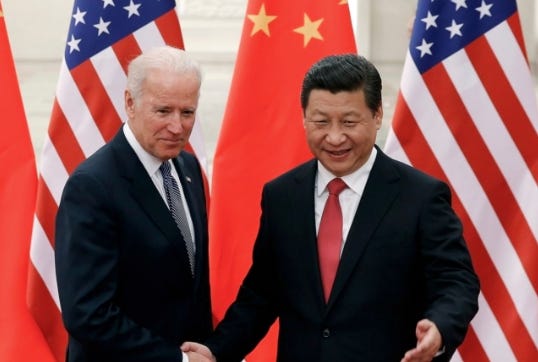Hello and welcome to What China Wants.
First of all, apologies that this is a day late, but as someone almost said, work is the curse of the writing classes.
Today I’m going to be looking at the fallout from last week’s Xi-Biden talks. Whilst they didn’t generate the same headlines as the Acrimony in Alaska in March, when the foreign ministries of both sides went hammer and tong at each other, it was still an important session and worth understanding.
One of the points of emphasis, from both sides, was the necessity on improving communication. The trouble is, ease of communication is a commodity in scant supply these days - and this really matters to the future of not only these two great powers, but their allies too. In What China Wants I try to unpick some of the issues causing this ill communication.
As always please do consider commenting, liking, and sharing. It’s always good to have feedback, especially when you don’t agree with me!
Many thanks for reading.
***
Last week saw the third meeting between Presidents Biden and Xi, conducted online. The talks came as the relationship between the two powers continues to slide, with tensions over commerce, security, and Taiwan all bubbling away, not to mention the American’s scolding of the Chinese premier for his COP26 no-show.
Yet in theory the conversations between Biden and Xi should be more productive than between Xi and Trump, and not just because of the former President’s manner. Biden and Xi have met each other a number of times before, including a summit in 2013 in Beijing when Biden was Obama’s vice-president. At that meeting, Xi called the then V-P “my old friend”.
But it doesn’t matter how many times the men meet, there will always be a spectre haunting them, and one that can lead to a great deal of conflict if not properly recognised and dealt with. Namely, miscommunication.
The conversation last week was wide-ranging, but an important one in terms of trying to construct better relations between the two.
For those who believe in the utility of commerce in forging strong international relations, it was a relief to hear agreement by Xi on the need to make it easier for American businessmen and women to travel across the country. The head of an American lobby group recently warned of a coming mass exodus of western executives unless Covid-related travel restrictions were eased.

Xi also restated a denial that China is looking to export its political system to others, despite what many in the US feel he is doing. Perhaps less controversially, Xi said that China will continue to open up its economy to the world. As the People’s Daily put it, China is “sending out fuel in snowy weather” by offering up its manufacturing and supply chain for other countries to use. The Chinese President didn’t however forgo the opportunity to point out how this is different to the American stance, coming as the talks did in the shadow of further US sanctions on Huawei and ZTE. “All global initiatives proposed by China are open to the United States, and I hope the US side will do the same’, said Xi.*
The centrepiece of the presidential talks was, not surprisingly, Taiwan. The Chinese side didn’t hold back.
Xi declared that the situation with Taiwan is becoming more serious because the Taiwanese authorities have repeatedly attempted to "rely on the United States to seek independence". Not only that, but some in the US are determined to "contain China with Taiwan". Xi then warned Biden that encouraging Taiwanese independence would be "playing with fire".
In response, Mr Biden was said by the White House to "strongly opposes unilateral efforts to change the status quo or undermine peace and stability across the Taiwan Strait".
The trouble is, this does not exactly chime with what Biden has been saying recently. At least twice the US President has stated that his country will defend Taiwan if it is attacked, an apparently clear departure from a long-held US foreign policy position.
Yet Mr Biden said the two had "always communicated with one another very honestly and candidly," adding "we never walk away wondering what the other man is thinking".
And this brings us on to the crux of the matter. Because despite the constructive words between Xi and Biden, if there’s one thing that we’ve learnt over the years – and this goes back to the Second World War, if not before – China and the West continually misinterpret each other. Just as one side thinks it understands what the other is doing, then they realise they have it all wrong.
Take the South China Sea. The Obama Administration was completely sideswiped by China; members of the Administration still to this day talk candidly (in private) about how they feel they were misled by Beijing. China, however, says that it gave no such non-militarisation pledge.

The South China Sea has plenty more reefs of miscommunication lying in wait. As I have written about before, one of the worries that us analysts have is of an accidental slide into conflict. And a key source of sparks to ignite such a conflict may be an accidental collision in the waters around Southeast Asia.
The problem is that there is no reliable way of dealing with an incident, not helped by the fact that there are two separate power structures on Chinese naval ships – the military one, and the political one. Which of them does a US captain talk to if there’s an immediate problem to sort out?
The US and China militaries as a whole barely talk. To rectify this, a special line has been established between them, designed to quell misunderstandings such as over the South China Sea. But this has only been successfully used once since Biden took office, and according to an American official, China is to blame: “the couple of times we've used it, just rung in an empty room for hours upon hours”.
A hotline between the Powers was a characteristic of the Soviet-American relationship in the years after the Cuban Missile Crisis. But then, communication between the USSR and the West was always easier than with China.
Thanks to years of interaction between Russian and European society, there was a deep hinterland of cultural understanding between the two sides despite the clash between communism and capitalism. In the recent film The Courier, starring Benedict Cumberbatch as a British businessman recruited by MI6 to bring messages back and forth from a mole inside the Soviet establishment, the two men are shown bonding at a performance of Swan Lake. Tchaikovsky fashioned Russian music from German folk tales and English writers, just one of the many artists to have bridged the gap between Russia and the rest of Europe.
It is a major problem for China-Western relations that this bridge just doesn’t exist between them, at least in the Western mind. Chinese students learn about Western cultural phenomena – movies, music, sport – and learn the language, but it is almost entirely one way. In England in 2019, for example, more than 120,000 children studied French for GCSE, 100,000 Spanish, 40,000 German – and 3,200 Chinese. More kids study Arabic, Urdu, and Polish.
Despite the recent (and rightful) furore on the disappearance of tennis star Peng Shuai, there is no real interest in anyone from the world of Chinese sport, music, or film. The graph below shows the amount of searches made on Google over the last 12 months for some of the leading Chinese celebrities from sport and film, loved by hundreds of millions of people in China. Given that Google search is banned in China, it is perhaps no surprise that their total registered interest is less than that of 65-year-old Tom Hanks.

Unless the West starts to invest in its understanding of China and Chinese culture, then Beijing will have the comprehension advantage. President Biden can say all he wants about understanding his counterpart, but it’s a near certainty that time will prove his Administration does not.
When the results of misunderstandings can lead to war between nuclear powers, this is some worry.
* I’m grateful to one of my favourite inside-China newsletters for some of the references here. If you haven’t read Pekingnology by Zichen Wang (yes, he knows he spelt it wrong) then you really should. Some incredible insights.


